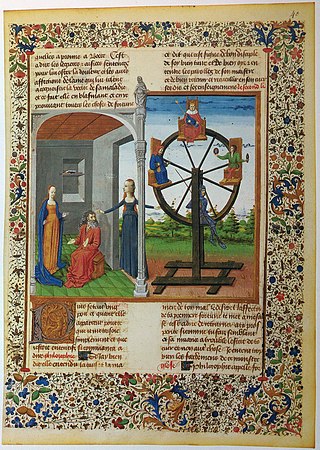
On the Consolation of Philosophy, often titled as The Consolation of Philosophy or simply the Consolation, is a philosophical work by the Roman philosopher Boethius. Written in 523 while he was imprisoned and awaiting execution by the Ostrogothic King Theodoric, it is often described as the last great Western work of the Classical Period. Boethius' Consolation heavily influenced the philosophy of late antiquity, as well as Medieval and early Renaissance Christianity.
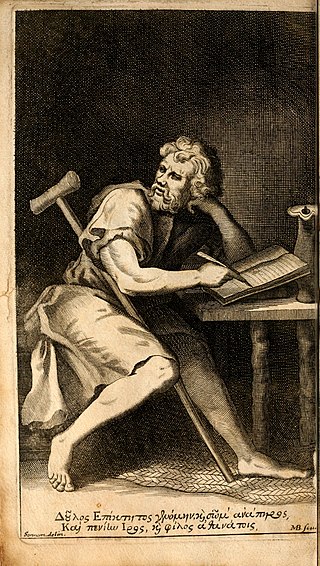
Epictetus was a Greek Stoic philosopher. He was born into slavery at Hierapolis, Phrygia and lived in Rome until his banishment, when he went to Nicopolis in northwestern Greece, where he spent the rest of his life. His teachings were written down and published by his pupil Arrian in his Discourses and Enchiridion.

Lucius Annaeus Seneca the Younger, usually known mononymously as Seneca, was a Stoic philosopher of Ancient Rome, a statesman, dramatist, and in one work, satirist, from the post-Augustan age of Latin literature.
This article presents lists of the literary events and publications in 1583.
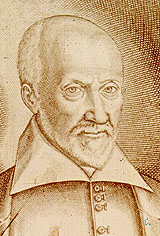
Pierre Charron, French Catholic theologian and major contributor to the new thought of the 17th century. He is remembered for his controversial form of skepticism and his separation of ethics from religion as an independent philosophical discipline.

Justus Lipsius was a Flemish Catholic philologist, philosopher, and humanist. Lipsius wrote a series of works designed to revive ancient Stoicism in a form that would be compatible with Christianity. The most famous of these is De Constantia. His form of Stoicism influenced a number of contemporary thinkers, creating the intellectual movement of Neostoicism. He taught at the universities in Jena, Leiden, and Leuven.
Martin Anton Delrio SJ was a Dutch Jesuit theologian. He studied at numerous institutions, receiving a master's degree in law from Salamanca in 1574. After a period of political service in the Spanish Netherlands, he became a Jesuit in 1580.

4 Maccabees, also called the Fourth Book of Maccabees and possibly originally known as On the Sovereignty of Reason, is a book written in Koine Greek, likely in the 1st or early 2nd century. It is a homily or philosophic discourse praising the supremacy of pious reason over passion. It is a work that combines Hellenistic Judaism with influence from Greek philosophy, particularly the school of Stoicism.

De re publica is a dialogue on Roman politics by Cicero, written in six books between 54 and 51 BC. The work does not survive in a complete state, and large parts are missing. The surviving sections derive from excerpts preserved in later works and from an incomplete palimpsest uncovered in 1819. Cicero uses the work to explain Roman constitutional theory. Written in imitation of Plato's Republic, it takes the form of a Socratic dialogue in which Scipio Aemilianus takes the role of a wise old man.
François Béroalde de Verville was a French Renaissance novelist, poet and intellectual. He was born in Paris, the son of Matthieu Brouard, called "Béroalde", a professor of Agrippa d'Aubigné and Pierre de l'Estoile and a Huguenot; his mother, Marie Bletz, was the niece of the humanist and Hebrew scholar François Vatable. At the time of the St. Bartholomew's Day Massacre, his family fled to Geneva (1573), but Béroalde returned to Paris in 1581. During the civil wars, Béroalde abjured Calvinism and joined the factions around Henri III of France. In 1589 he moved to Tours, and became chanoine (canon) of the cathedral chapter of Saint Gatien, Tours, where he remained until his death.
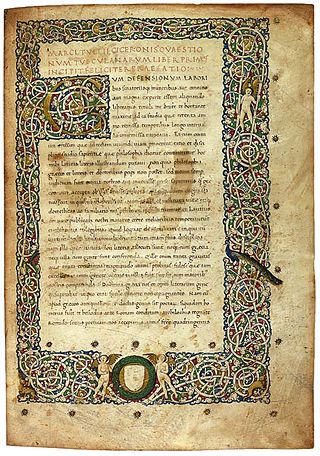
The Tusculanae Disputationes is a series of five books written by Cicero, around 45 BC, attempting to popularise Greek philosophy in Ancient Rome, including Stoicism. It is so called as it was reportedly written at his villa in Tusculum. His daughter had recently died and in mourning Cicero devoted himself to philosophical studies. The Tusculan Disputations consist of five books, each on a particular theme: On the contempt of death; On pain; On grief; On emotional disturbances; and whether Virtue alone is sufficient for a happy life.

De Natura Deorum is a philosophical dialogue by Roman Academic Skeptic philosopher Cicero written in 45 BC. It is laid out in three books that discuss the theological views of the Hellenistic philosophies of Epicureanism, Stoicism, and Academic Skepticism.
Neostoicism was a philosophical movement that arose in the late 16th century from the works of Justus Lipsius, and sought to combine the beliefs of Stoicism and Christianity. Lipsius was Flemish and a Renaissance humanist. The movement took on the nature of religious syncretism, although modern scholarship does not consider that it resulted in a successful synthesis. The name "neostoicism" is attributed to two Roman Catholic authors, Léontine Zanta and Julien-Eymard d'Angers.

Stoicism is a school of Hellenistic philosophy that flourished in Ancient Greece and Ancient Rome. The Stoics believed that the practice of virtue is enough to achieve eudaimonia: a well-lived life. The Stoics identified the path to achieving it with a life spent practicing the four virtues in everyday life: wisdom, courage, temperance or moderation, and justice, and living in accordance with nature. It was founded in the ancient Agora of Athens by Zeno of Citium around 300 BC.

Sir John Stradling, 1st Baronet, was an English poet, scholar and politician.
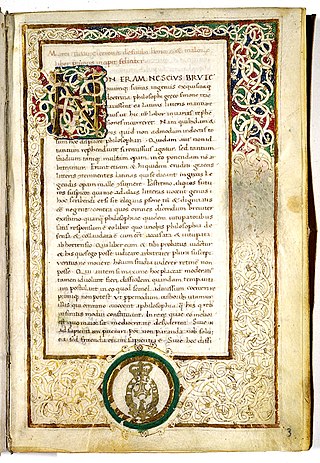
De finibus bonorum et malorum is a Socratic dialogue by the Roman orator, politician, and Academic Skeptic philosopher Marcus Tullius Cicero. It consists of three dialogues, over five books, in which Cicero discusses the philosophical views of Epicureanism, Stoicism, and the Platonism of Antiochus of Ascalon. The treatise is structured so that each philosophical system is described in its own book, and then disputed in the following book. The book was developed in the summer of the year 45 BC, and was written over the course of about one and a half months. Together with the Tusculanae Quaestiones written shortly afterwards and the Academica, De finibus bonorum et malorum is one of the most extensive philosophical works of Cicero.
Nathaniel Wanley was an English clergyman and writer, known for The Wonders of the Little World.

De Tranquillitate Animi is a Latin work by the Stoic philosopher Seneca. The dialogue concerns the state of mind of Seneca's friend Annaeus Serenus, and how to cure Serenus of anxiety, worry and disgust with life.

De Ira is a Latin work by Seneca. The work defines and explains anger within the context of Stoic philosophy, and offers therapeutic advice on what to do to prevent anger.
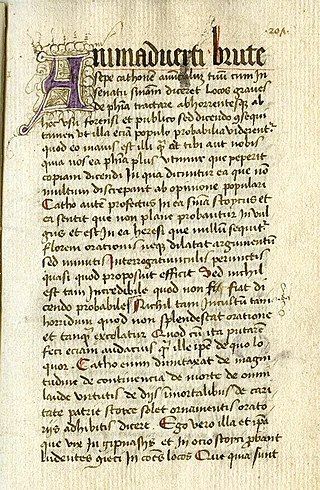
The Paradoxa Stoicorum is a work by the academic skeptic philosopher Cicero in which he attempts to explain six famous Stoic sayings that appear to go against common understanding: (1) virtue is the sole good; (2) virtue is the sole requisite for happiness; (3) all good deeds are equally virtuous and all bad deeds equally vicious; (4) all fools are mad; (5) only the wise are free, whereas all fools are enslaved; and (6) only the wise are rich.















